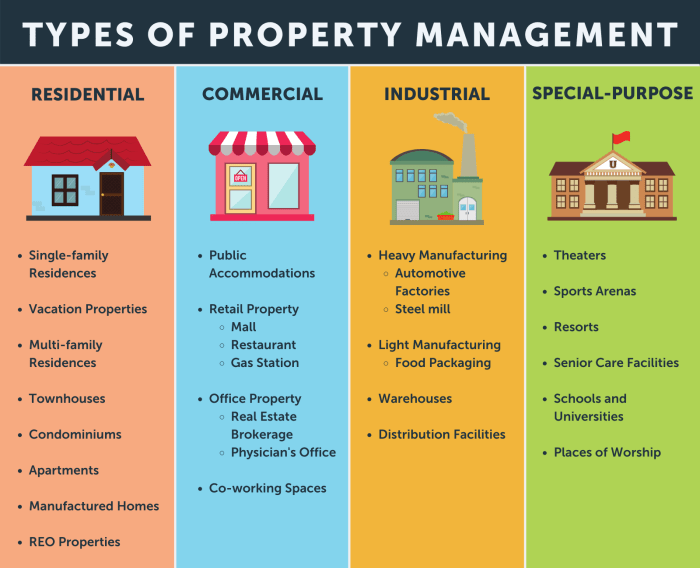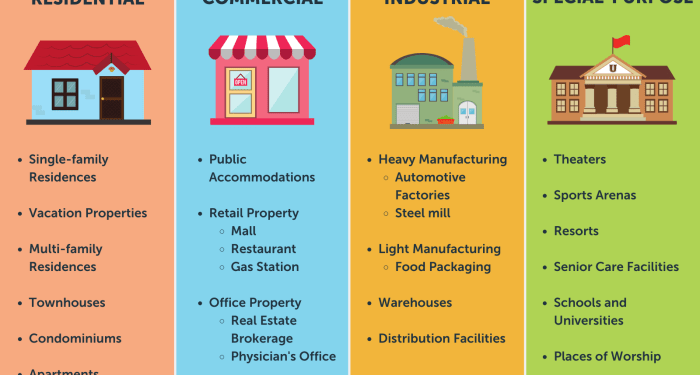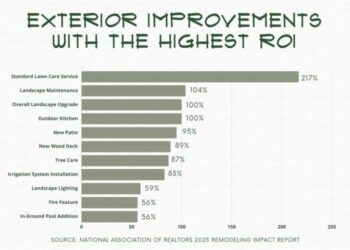Delving into the realm of residential property management, it is essential to understand the intricacies and responsibilities that come with overseeing such properties. From marketing strategies to tenant screening processes, this guide covers it all to help you navigate the world of managing residential properties effectively.
Introduction to Residential Property Management
Residential property management involves the oversight, operation, and control of residential real estate properties. It encompasses various tasks related to maintaining and maximizing the value of these properties while ensuring a positive experience for tenants.
Importance of Effective Property Management for Residential Properties
Effective property management is crucial for residential properties to ensure the smooth operation and maintenance of the premises. It helps in maximizing the return on investment for property owners, while also providing a safe and comfortable living environment for tenants.
- Regular Maintenance: Property managers are responsible for ensuring that the property is well-maintained, addressing any repairs or issues promptly to prevent further damage.
- Tenant Relations: Building positive relationships with tenants is essential for a successful residential property management. This includes addressing tenant concerns, handling complaints, and ensuring timely rent collection.
- Financial Management: Property managers oversee the financial aspects of the property, including setting rental rates, budgeting for expenses, and collecting rent payments.
- Legal Compliance: Staying up-to-date with local housing laws and regulations is a key responsibility of property managers to ensure the property is in compliance with all legal requirements.
Key Responsibilities of Residential Property Managers
Residential property managers have a wide range of responsibilities to ensure the efficient operation of the property and the satisfaction of both owners and tenants.
- Marketing and Advertising: Attracting and screening potential tenants through effective marketing strategies.
- Lease Management: Negotiating and enforcing lease agreements, handling lease renewals, and terminations.
- Property Inspections: Conducting regular inspections to ensure the property is well-maintained and identifying any areas that require attention.
- Emergency Response: Being available to handle emergencies and urgent maintenance issues that may arise outside of regular business hours.
Rental Property Marketing

In the competitive residential rental market, effective marketing strategies play a crucial role in attracting tenants and maximizing occupancy rates. Utilizing various platforms and creating compelling property listings are key components in reaching potential renters.
Role of Online Platforms
Online platforms have revolutionized the way rental properties are advertised. Websites like Zillow, Apartments.com, and Craigslist allow property managers to reach a wide audience quickly and efficiently. Social media platforms such as Facebook and Instagram also provide opportunities to showcase properties through targeted ads and engaging posts.
Creating Compelling Property Listings
Use high-quality photos
Visuals are essential in capturing the attention of potential tenants. Ensure photos are well-lit, showcase key features of the property, and accurately represent the space.
Highlight unique selling points
Whether it's a spacious backyard, newly renovated kitchen, or proximity to amenities, emphasize what sets the property apart from others in the market.
Provide detailed descriptions
Clearly Artikel the number of bedrooms and bathrooms, square footage, included utilities, and any special amenities or features. Be honest and transparent about the property to manage tenant expectations.
Utilize s
Incorporate relevant s in your listing titles and descriptions to increase visibility in online searches. Consider terms that tenants are likely to use when looking for a rental property in your area.
Include a strong call to action
Encourage prospective tenants to schedule a viewing, inquire about the property, or submit an application by providing clear contact information and next steps.
Tenant Screening Process
When it comes to managing residential properties, one of the most crucial aspects is the tenant screening process. This step ensures that you find reliable tenants who will take care of your property and pay rent on time.
Importance of Screening Potential Tenants
Screening potential tenants is essential to protect your property and investment. It helps in selecting tenants who are likely to fulfill their lease obligations, maintain the property, and create a positive living environment for other tenants.
- Verify Income: Ensure that the tenant has a stable income to afford rent.
- Check Rental History: Look into their past rental experiences to see if they were responsible tenants.
- Review Credit Score: A good credit score indicates financial responsibility.
- References: Contact previous landlords or employers for feedback on the tenant.
Legal Considerations and Best Practices
When screening tenants, it's important to follow fair housing laws and regulations to avoid discrimination. Here are some best practices to consider:
- Use a standard rental application form for all applicants to maintain consistency.
- Set clear criteria for tenant approval based on factors like income, credit score, and rental history.
- Inform all applicants about the screening process and criteria to ensure transparency.
- Keep detailed records of all applicant screenings to demonstrate compliance with fair housing laws.
Property Maintenance and Repairs
Residential property managers have a crucial role in ensuring the maintenance and upkeep of rental units. Timely repairs and proactive maintenance are essential to preserve the asset value and provide a safe and comfortable living environment for tenants.
Maintenance Responsibilities of Residential Property Managers
- Regular inspections to identify any maintenance issues
- Addressing repair requests from tenants promptly
- Coordinating with vendors and contractors for repairs and maintenance work
- Implementing preventive maintenance measures to avoid costly repairs
Importance of Timely Repairs and Upkeep of Rental Units
Timely repairs are crucial to prevent small issues from escalating into larger, more expensive problems. Neglecting maintenance can lead to decreased property value and tenant dissatisfaction. Regular upkeep ensures a safe and habitable living space, enhancing tenant retention and overall property appeal.
Tips for Proactive Property Maintenance
- Establish a regular maintenance schedule for inspections and repairs
- Respond promptly to repair requests from tenants
- Invest in preventive maintenance measures to prolong the lifespan of appliances and systems
- Regularly check for signs of wear and tear and address them before they become major issues
- Work with reputable vendors and contractors for quality repairs and maintenance services
Rent Collection and Financial Management
Effective rent collection procedures are crucial for the smooth operation of residential properties. Landlords or property managers should establish clear guidelines for rent payments, including due dates, acceptable payment methods, and consequences for late payments.Financial management plays a vital role in ensuring the profitability of rental properties.
It involves budgeting, tracking income and expenses, analyzing financial reports, and making strategic decisions to optimize revenue and minimize costs.
Strategies for Handling Late Payments and Rent Arrears
- Send reminders: Promptly remind tenants of upcoming rent deadlines to encourage on-time payments.
- Implement late fees: Clearly Artikel late fee policies in the lease agreement to incentivize timely payments.
- Offer payment plans: In cases of financial hardship, consider negotiating payment plans to help tenants catch up on rent.
- Consider legal action: As a last resort, consult with legal professionals to pursue eviction proceedings for non-payment of rent.
Role of Financial Management in Rental Properties
- Establishing and monitoring budgets: Set financial goals and track income and expenses to ensure profitability.
- Analyzing financial reports: Regularly review financial statements to identify trends and make informed decisions.
- Optimizing revenue streams: Explore opportunities to increase rental income through rent adjustments or additional services.
- Minimizing costs: Implement cost-saving measures and maintenance strategies to maximize profitability.
Legal Compliance and Regulations
Residential property management is subject to a variety of laws and regulations to ensure the fair treatment of tenants and proper maintenance of properties. It is crucial for property managers to stay informed and compliant with these legal requirements to avoid potential legal issues and maintain a positive reputation in the industry.
Key Laws and Regulations
- The Fair Housing Act: Prohibits discrimination based on race, color, religion, sex, disability, familial status, or national origin in the rental, sale, or financing of housing.
- Landlord-Tenant Laws: Govern the rights and responsibilities of both landlords and tenants, including lease agreements, security deposits, eviction procedures, and maintenance obligations.
- Local Building Codes: Regulations that ensure properties meet safety and health standards, covering areas such as electrical systems, plumbing, and structural integrity.
Importance of Compliance
Maintaining compliance with fair housing laws and other regulations is essential to protect tenants from discrimination and ensure a safe and habitable living environment. Non-compliance can lead to legal disputes, financial penalties, and damage to the property manager's reputation. It is crucial for property managers to prioritize compliance and stay informed about any changes or updates to relevant laws.
Tips for Staying Updated
1. Regularly review legal updates from industry publications, government websites, and professional associations.
2. Attend training seminars, workshops, or webinars on legal compliance in property management.
3. Consult with legal professionals specializing in real estate law to address any compliance concerns or questions.
Tenant Relations and Conflict Resolution

Effective communication plays a crucial role in maintaining positive tenant relations. It is essential for landlords to establish clear and open lines of communication with their tenants to address any concerns or issues that may arise.
Strategies for Resolving Conflicts
- Listen actively to tenant concerns and grievances to understand their perspective.
- Communicate clearly and professionally to ensure that both parties are on the same page.
- Seek mutually beneficial solutions through negotiation and compromise.
- Document all agreements and resolutions in writing to prevent misunderstandings in the future.
Maintaining Positive Relationships
- Show respect and empathy towards tenants to build trust and rapport.
- Address maintenance requests and issues promptly to demonstrate care for the tenant's well-being.
- Provide clear guidelines and expectations to prevent misunderstandings and conflicts.
- Reward good tenant behavior and prompt rent payments to reinforce positive relationships.
Final Conclusion
In conclusion, residential property management requires a delicate balance of various tasks and responsibilities to ensure the smooth operation and profitability of rental properties. By implementing the strategies and tips discussed in this guide, you can streamline your management approach and foster positive relationships with tenants for long-term success.
FAQ Summary
What are the key responsibilities of residential property managers?
Residential property managers are tasked with overseeing property maintenance, tenant relations, rent collection, and ensuring legal compliance among other duties.
How can property managers effectively handle late rent payments?
Property managers can implement clear rent collection procedures, send reminders for due dates, and establish consequences for late payments to address this issue efficiently.
What are the legal considerations in tenant screening?
Legal considerations in tenant screening include fair housing laws, background checks, credit history verification, and adhering to anti-discrimination regulations.














